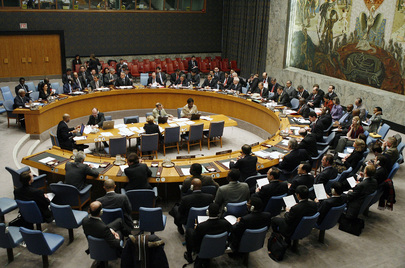UN Security Council considers sanctions on South Sudan
February 25, 2015 (NEW YORK) – The United Nations Security Council (UNSC) is considering sanctions on both sides of the South Sudanese conflict for continued fighting despite several commitments to honour a signed ceasefire agreement.

The United States is behind the draft resolution calling for sanctions on South Sudan.
The conflict, which broke out in late 2013, followed disagreements within the ruling party (SPLM) led by president Salva Kiir, but later turned into what has now been perceived as a power struggle between Kiir and his former deputy, Riek Machar.
South Sudan opposes calls for sanctions, with its UN ambassador telling the UNSC that sanctions “would only generate adversarial relationship and aggravate the situation”.
“It is one thing to condemn the leadership of the country and threaten the imposition of sanctions, which, as I have had occasion to say to the Council, would only generate adversarial relationship and aggravate the situation,” Francis Deng said on Tuesday.
However, the UNSC underscored its willingness to impose targeted sanctions in order to support the search for an inclusive and sustainable peace in South Sudan.
Sanctions will apply to individuals and entities “responsible for or complicit in, or having engaged in, directly or indirectly, actions or policies that threaten the peace, security or stability of South Sudan”.
Both warring parties signed a cessation of hostilities agreement early last year and recommitted to it, but are yet to fully respect the deal.
This month, the two parties signed an agreement on power-sharing arrangement proposed by the East African regional bloc (IGAD), as fresh round of talks commenced in Ethiopia.
The USC expressed concerns over actions or policies such as breach of the cessation of hostilities deal as well as actions or policies that threaten transitional agreements or undermine democratic processes or institutions in South Sudan.
OPOSED MEASURES
According to the draft resolution, all UN members shall take the necessary measures to prevent entry into or transit through their territories of any individuals who may have been slapped sanctions.
The USC is also proposing that all member states freeze without delay all funds, other financial assets and economic resources which are on their territories, which are owned or controlled, directly or indirectly, by any individuals or entities as may be recommended by the committee.
The decision will reportedly also affect individuals or entities acting on their behalf or at their direction, or by entities owned or controlled by them.
“Member States shall for this initial period ensure that neither these nor any other funds, financial assets or economic resources are made available, directly or indirectly for such persons’ benefit, by their nationals or by persons within their territory,” reads the draft resolution.
The London-based Economic Frontiers has predicted that the South Sudan conflict could cost the country between $22 and $28 billion if it continues unabated over the next one to five years.
Last year, Washington, the European Union and Canada imposed sanctions on military generals from both sides of the conflict for allegedly obstructing South Sudan talks.
However, there have also been several calls for an arms embargo on South Sudan from activists, local and international human rights groups.
(ST)
